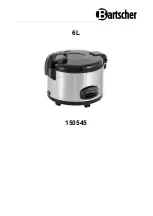
Moving the Cooker
Fig. B
Fig. C
Gas connection
The cooker should be connected to the gas-supply
by a gas safe registered installer. During installation
of this product it is essential to fit an approved gas
tap to isolate the supply from the appliance for the
convenience of any subsequent removal or servicing.
Connection of the appliance to the gas mains or liquid
gas must be carried out according to the prescribed
regulation in force, and only after it is ascertained that it
is adaptable to the type of gas to be used. If not, follow
the instructions indicated in the paragraph headed
“Adaptation to different gas types”. On some models
the gas supply can be connected on the left or on the
right, as necessary; to change the connection, reverse
the position of the hose holder with that of the cap and
replace the gasket (supplied with the appliance). In the
case of connection to liquid gas, by tank, use pressure
regulators that conform to the regulation in force. The
gas supply must be
connected to the
left of the appliance.
Be sure that the
hose does not pass
through the rear of
the cooker touching
hot parts.
! Make sure the
supply pressure
conforms with the values shown in the table entitled
“Caracteristics of the burners and nozzles”.
When the cooker is installed between cabinets
(recessed), the gas connection must be effected
by an approved flexible hose with bayonet fitting
(BS 669 Current Edition). The gas inlet for the cookers
is a threaded G 1/2 gas female fitting.
HOT PARTS
600 mm
Connecting the gas supply
To make the connection, a flexible hose should be
used corresponding to the current gas regulations
which are:
• the hose must never be at any point in its lenght in
contact with the “hot” parts of the cooker;
• the hose must never be longer than 1,5 metre;
• the hose must not be subject to any tension or
torsional stress and it must not have any excessively
narrow curves or bottlenecks;
• the hose must be easy to inspect along its entire
length to check its condition;
• the hose must always be in good condition, never
attempt to repair.
! The installation must comply with gas safety
(installation and use) regulations 1984. In all cases for
the above, by low, a qualified, gas safe approved engineer
must be called for installation.
Disposing of the appliance
When disposing of the appliance please remove the
plug by cutting the mains cable as close as possible to
the plug body and dispose of it as described above.
Adapting the cooker to different types of gas*
In order to adapt the cooker to a different type of gas
with respect to the gas for which it was produced
(indicated on the label attached to the lid), follow these
steps:
a) replace the hose holder mounted on the
appliance with that supplied in the bag of
“cooker
accessories”.
b) Replacing the burner nozzles on the hob:
• remove the grids and slide the burners from their
housings;
• unscrew the nozzles using a 7 mm socket spanner,
and replace them with
nozzles for the new
type of gas (see table
1 “Burner and nozzle
characteristics”).
• replace all the
components by repeating
the steps in reverse order.
* (only available on certain models)
The appliance must not be installed behind
a decorative door in order to avoid overheating
EN
7
!
This procedure must be performed by a qualified
technician who has been authorised by the
manufacturer.






































